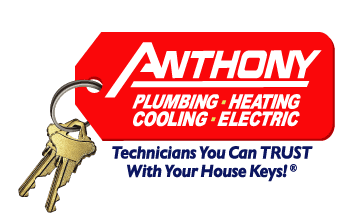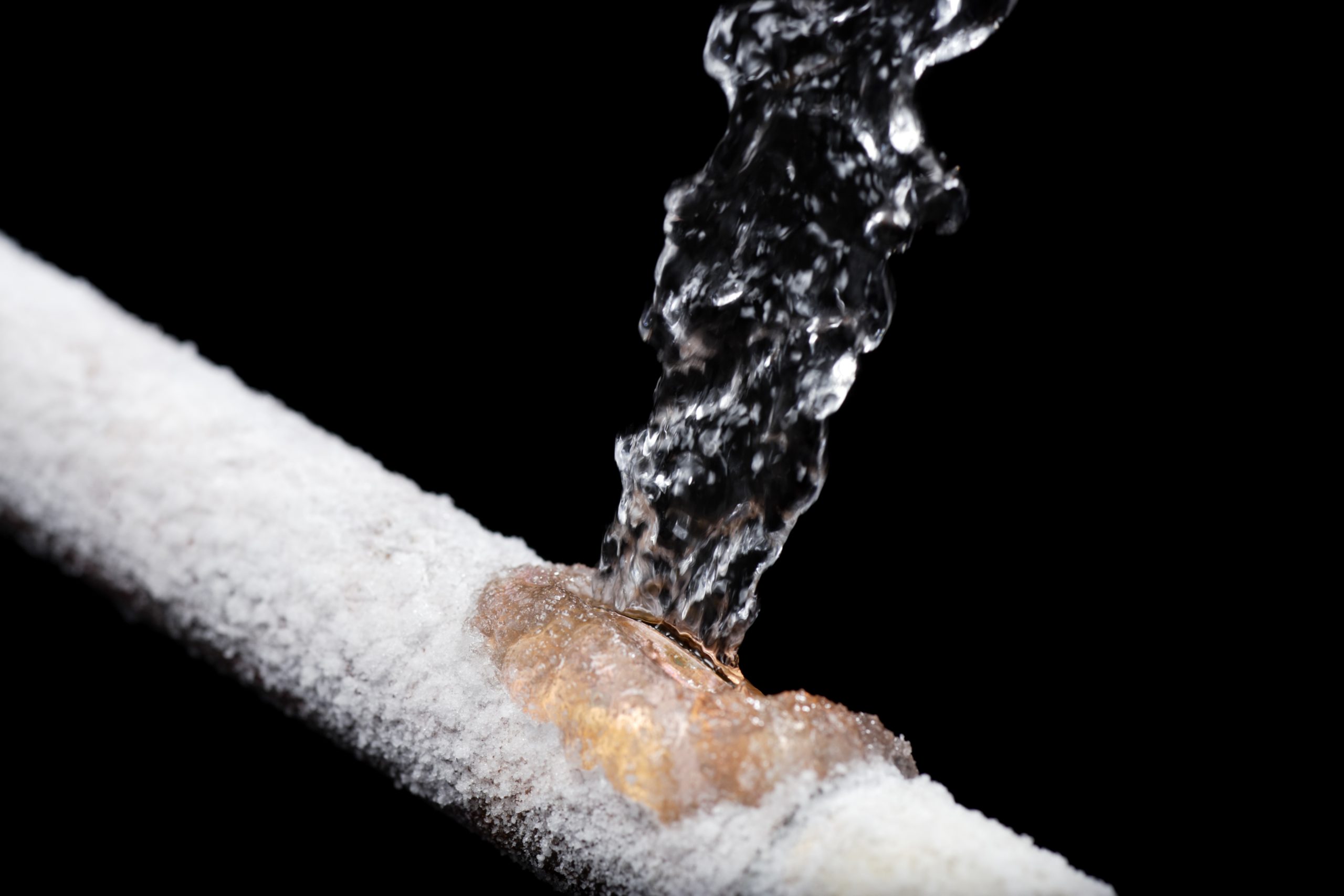Pipes freezing and bursting during the winter is a fairly common occurrence.
Most of the time if there’s no water in your home after a deep freeze, it’s due to a frozen pipe. But when a water pipe breaks inside a home it can be devastating, especially if the pipe bursts in an upper story and causes a waterfall to form all the way down to the basement.
No house is exempt from the risk of frozen and bursting water pipes, but fortunately there are things you can do to prevent them.
Preparation is Key to Preventing Pipes from Bursting
“Preparation is key,” says Steve Burbridge, at Anthony Plumbing, Heating & Cooling. “Learn the location of your main water shutoff valve in case a pipe breaks.”
A plumbing safety inspection is a good way to identify, and protect against, potential pipe freezing points. Have a highly-trained plumber come out and give your plumbing a fitness check. They will also check for potential leaks and other looming problems while they are at your home, such as pipe-damaging hard water and carbon monoxide leaks from your water heater vent.
It is important to know the hours your plumber is available, especially if they work evenings. If yours does not, find one that does, in case your pipes burst at night when air temperatures are at their coldest. Anthony Plumbing, Heating & Cooling has plumbers in the field until midnight every night, and have experts to assist homeowners over the phone 24 hours a day.
Protecting Garage Pipes from Freezing
Water pipes in rooms that are not heated are especially vulnerable to freezing and bursting. Because most garages are not heated, water pipes running through the garage are vulnerable to freezing and bursting this time of year. Keeping your garage door closed is one way to keep out the cold. Placing a UL-listed electric space heater near pipes will also keep them from freezing.
An Auto-Ray infrared garage heater, installed by Anthony Plumbing, Heating & Cooling, is the ideal way to protect the pipes from freezing and bursting in your garage, and in the rooms next to your garage. And, ice and snow brought in on the car the night before will be GONE the next morning and the floor will be dry! The Auto-Ray infrared garage heater heats a 2-3 car garage using inexpensive natural gas for about $10 a month. And no more getting into a cold car!
Prevent Your Kitchen Sink from Freezing
It’s not unusual for plumbing running to a kitchen sink on an exterior wall to be extremely vulnerable. Open the cabinet doors along that wall to allow heat into the space. Place an electric heater in front of the cabinets for an extra measure of cold protection, or leave the faucet dripping water if extremely cold and windy outside.
Place A Space Heater in Any Non-Heated Rooms
Keep unprotected pipes above freezing by simply placing a UL-listed electric heater near them. Remember, the goal is not to make the space toasty warm and comfortable. It’s to keep the water in the pipe above freezing.
Drip a Faucet Furthest from Your Water Main Valve
Turning on a faucet furthest from your water main valve overnight keeps water running through your pipes while you sleep, and running water is less likely to freeze.
Make Sure the Hoses are Removed from Your Outdoor Faucets
Leaving the hose on your outdoor faucet during the winter can cause water from the hose to back up into the faucet plumbing. This water will expand inside and split the piping during freezing weather. Remove and drain hoses used outside, and store them away until spring.
A newer innovation is the one quarter turn valve frost-free faucet, which allow for hoses to be left on all year round. Not sure if you have a one quarter turn valve frost-free faucet installed? If you’re not sure if your faucet is frost free, call a plumbing expert to make that determination.
How to Winterize Your Plumbing While You Are Away
If you plan to be away from your home during the winter months, you need to take steps to prevent the pipes from freezing and bursting while you are away. It is best to call a highly-trained plumber to assist you in these steps, especially if it is your first time taking them. Considering the massive damage a broken pipe can cause, it’s worth it to take a little extra precaution.
- Invest in smart home automation technology systems.
- Turn off the main water service valve.
- Turn off the gas valve on the water heater, or if you have an electric water heater, turn off the breaker that supplies power to it.
- Open all indoor faucets, both hot and cold sides. This includes sinks, lavatories, showers, and bathtubs. Unhook the washing machine hoses and open these two valves. NOTE: If you have water filters or a water softener, these will also need to be drained.
- Flush all toilets to drain most of the water out of the tanks. Pour some propylene glycol (antifreeze — not ethylene glycol which is toxic and used in cars) in the tanks to mix with the remaining water and pour one pint of non-diluted antifreeze into each toilet bowl.
- Pour propylene glycol into each drain trap in the home. These include sinks, lavatories, tubs, showers, and the washing machine discharge pipe.
- If you have a sump pump, have a battery back-up sump pump which will activate, even if there is no power.
What to Do if Your Pipes Freeze, but Don’t Burst
If your pipes won’t deliver water and you suspect they might be frozen, take these steps immediately:
- Try all the faucets – is there only one or two that are frozen?
- Shut off your main water, to prevent further damage.
- Thaw the frozen pipes – use gentle heat from a hair dryer.
- Carefully restore water; once the pipe is thawed turn your main water valve back on and SLOWLY turn your faucet back on.
What to Do if Your Pipes Burst
If the worst happens and your pipes burst, turn off your water main and call a highly-trained plumber immediately. Plumbers at Anthony Plumbing, Heating & Cooling are in the field until midnight every night, and we have experts answering the phones 24/7 that can help you. Call us at A-N-T-H-O-N-Y, KS (913) or MO (816), 913-268-4669 or 816-268-4669.

